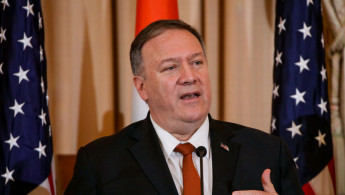Pompeo does 'not know the answer yet' if US will work with new Lebanon government
"We'll have to take a look at it. I don't know the answer to that yet," the top US diplomat told Bloomberg in an interview from Jamaica.
In a separate statement, Pompeo called on new government to enact serious reforms to tackle the twin challenges of a collapsing economy and angry street protests.
"The test of Lebanon's new government will be its actions and its responsiveness to the demands of the Lebanese people to implement reforms and to fight corruption," Pompeo said in a statement.
"Only a government that is capable of and committed to undertaking real and tangible reforms will restore investor confidence and unlock international assistance for Lebanon," he added.
Lebanon's new Prime Minister Hassan Diab formed a 20-member government late on Tuesday made up of Hezbollah and its allies.
Pompeo said he saw what happened "over the last 24 hours", and that Washington has been "very clear" about the requirements for the US to engage.
Twitter Post
|
He cited Lebanon's "terrible financial crisis that lays in front of it in just the weeks ahead".
Pompeo said that Washington was prepared to engage and provide support to Diab's government, "but only to a government that’s committed to reform".
Speaking about the nationwide anti-government protests that have been taking place since 17 October, Pompeo said the US wanted a "non-corrupt government" that reflects the will of the Lebanese people.
"If this government is responsive to that and there's a new set of leaders that's prepared to make those commitments and deliver on that, that's the kind of government that we’ll support around the world and the kind of government we would support in Lebanon," Pompeo said.
Lebanese Prime Minister Hassan Diab said on Wednesday his country faces a "catastrophe" after his newly unveiled cabinet held its first meeting.
Anger at what protesters see as a kleptocratic oligarchy was initially fuelled by youth unemployment that stands at more than 30 percent and the abysmal delivery of public services such as water and electricity.
The long-brewing discontent was compounded by fears of a total economic collapse in recent weeks, with a liquidity crunch pushing banks to impose crippling capital controls.





 Follow the Middle East's top stories in English at The New Arab on Google News
Follow the Middle East's top stories in English at The New Arab on Google News
![Israeli forces ordered bombed Gaza's Jabalia, ordering residents to leave [Getty]](/sites/default/files/styles/image_330x185/public/2176418030.jpeg?h=a5f2f23a&itok=_YGZaP1z)

